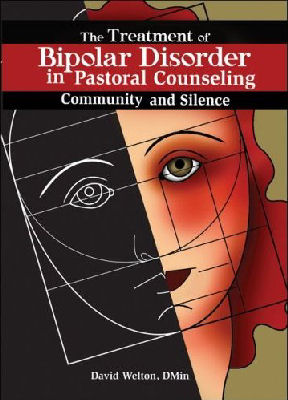
|
Posted January 9, 2007
Book: The Treatment of Bipolar Disorder in Pastoral Counseling Author: David Welton The Haworth Pastoral Press. Binghamton, NY. 2006. Pp. 125 An Excerpt from the Introduction:
The focus of this book will be current understandings of bipolar disorder in medical and psychological disciplines, and new approaches to pastoral counseling that might be of use to the therapist. An Excerpt from the Book: The positive functions assigned to recognizing one’s guilt include avoiding pride, learning what is ethical, and discovering our limitedness in relation to God. On the negative side, guilt is correlated to the major psychiatric disorders of major depression, PTSD, substance abuse, and OCD. The author’s conclude with a discussion of guilt and healing. Their reflections include the universality of need for forgiveness and reconciliation. The role of the priest in the confessional is one expression of this need, as is the more general role of pastoral care in the church. They also highlight the reconciliation of the community as modeled in Paul’s Second Letter to the Corinthians. Also, the secular psychotherapist finds himself in the role of receiving confession. Here is where science and religion meet again. The act of confession is an inherently religious act, yet carried out in the setting with the counselor where “the implications of the client’s past and future behavior can be examined in that context.” The counselor listens to the person’s story with ears to hear the themes of brokenness and redemption. In this way, the ways of science and religion are held together. The contributions to the literature on bipolar disorder by pastoral counselors has been limited, but what has been present is the dialogue with the behavioral sciences in understanding and treating mania and depression, and the value of a systems approach therapy. The best methods seem to be those that include a model of community that is called upon as a resource in giving care, such as the congregation, the mental health services profession, and medical professionals who treat the biological components of bipolar disorder. In this way the systems model involves not only the family but the community at large. Pastoral counseling in his respect is defined as mobilizing all available resources on the client’s behalf. Conclusion By its very nature our work often brings us to the threshold of human mystery. It involves sensitivity to the tangled workings of the human mind and heart, and openness to the ultimate concerns that give meaning to people’s lives. These areas are of the utmost importance to the church, and call to mind the urgent need for a constructive dialogue between science and religion for the sake of shedding greater light on the mystery of man in his fullness. – Pope John Paul II, 1993. This proclamation by the Holy Father echoed the voice sounded at the Second Vatican Council, “The Church in the Modern World.” This council in every way sought to enter the dialogue between religion and science, and offer a way for contemporary Catholics to maintain faith and be enlightened by the onrushing advances in the biological and behavioral sciences. Table of Contents: 1. Current research into bipolar disorder 2. Current pastoral counseling theory 3. Quaker treatment of mentally ill 4. Silence and psychotherapy with bipolar disorder 5. Community in treatment 6. Theological reflection on bipolar disorder |
|
